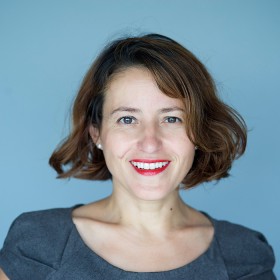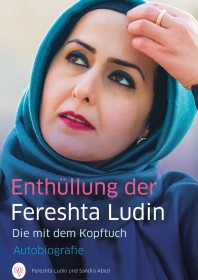Impressions of the “Obedience” Exhibition, from Muslim and Christian Perspectives
During the recent “Long Night of Museums” event, visitors were given a unique introduction to our current temporary exhibition “Obedience. An Installation in 15 Rooms by Saskia Boddeke & Peter Greenaway,” when the imam Emine Erol and the pastor Silke Radosh-Hinder led guided tours together. We asked the two women what they made of the occasion, and whether the joint guided tours had opened up novel views and perspectives on the biblical story.
Ms Erol, Ms Radosh-Hinder, would each of you describe the exhibition in your own words?
Silke Radosh-Hinder: For me, the exhibition is above all an opportunity to examine the story of the Binding of Isaac from a myriad of perspectives.
Emine Erol: The primary focus of the Obedience exhibition is the frame of mind of Ismael/Isaak respectively of his father Abraham. By prompting an emotional response and reflection, it helps visitors understand, ultimately, that such surrender may be dangerous or possibly even fatal—and also to understand what may motivate it. → continue reading
The “Daughters and Sons of Gastarbeiters” (guest workers) are the Academy of the Jewish Museum Berlin’s guest on 14 October 2015, part of the “New German Stories” series. As children, these Berlin authors followed their parents to Germany from their home villages in Anatolia, southern Europe and the Balkans, or they were born into working-class neighborhoods around Germany. Their mothers and fathers were supposed to bolster the German economic recovery as mere “guest workers”. The authors tell their personal stories, look back, follow their parents’ paths and thus add to Germany’s culture of memory. In advance of the event, we’ve asked three questions of Çiçek Bacık, the project’s leader and co-initiator:

Çiçek Bacık © Neda Navaee
Ms. Bacık, how did the “Daughters and Sons of Gastarbeiters” come to be and what was the motivation to tell these personal stories?
Last year, I went to a reading with my friend, the journalist Ferda Ataman. We were sitting in a bar afterwards. “Ferda, we have to start telling our stories and share them with others. We ourselves have to shed light on a dark chapter of our past we’ve successfully repressed,” I said. “Sure, and what’s stopping us?” That was the starting point for “Daughters and Sons of Gastarbeiters”. Our first reading took place in January 2015 at the Wasserturm in Kreuzberg. → continue reading
A Conversation with Fereshta Ludin about the Headscarf Debate, Discrimination, and Her Hopes for the Future.
To win the right to work as a teacher in the classroom while wearing her headscarf, Fereshta Ludin had to go all the way to the German Supreme Court (see below). On 17 September 2015, she will join us as part of the series “New German Stories” to introduce her book Enthüllung der Fereshta Ludin. Die mit dem Kopftuch (“The Unveiling of Fereshta Ludin: The One with the Headscarf”). Rafiqa Younes and Julia Jürgens spoke with her in the lead-up to the event.

Book cover © Deutscher Levante Verlag
Ms. Ludin, did you ever guess that the first lawsuit you filed against your employers, in 1998 when you were 25 years old, would set off a nationwide debate about the headscarf ban?
You can’t really imagine something like that. I was still very young and idealistic. I wanted to work as a teacher and had no intention of provoking the public or any politicians.
From your perspective, was it worth it to go all that way through courts, becoming, as you did, a public figure – “the one with the headscarf” as the title of your book ironically references?
I don’t regret a single step along the way. I would have regretted much more, to have had to endure the injustice. I took an active stand against discrimination by going through the courts. Many other women were also affected. It was never my aim to become a public person. → continue reading

